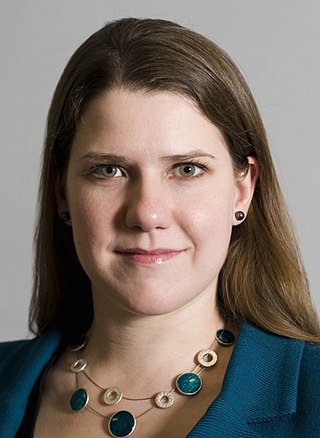Liberal Democrats (UK)
centrist political party in the United Kingdom From Wikipedia, the free encyclopedia
Remove ads
The Liberal Democrats, often shortened to Lib Dems, is a centrist political party in the United Kingdom that promotes liberal policies. It was started on 2 March 1988 by joining the Liberal Party, which had been a powerful political party in Britain in the 19th and early 20th centuries, and the Social Democratic Party, which had been formed from the Labour Party in 1981. The two parties had already been working together for seven years.
Remove ads



11 May 2010 – 8 May 2015.
The Liberal Democrats are strong supporters of the European Union, as well as environmentalism and they are in favour of creating a new British House of Commons which is elected using proportional representation. They also disagree with Britain being a part of conflicts like the Iraq War.
The party has 72[21] out of 650 seats in the House of Commons, 84[22] out of 783 seats in the House of Lords, 16 out of 73 British seats in the European Parliament, 5 out of 129 seats in the Scottish Parliament and 1 out of 60 seats in the Welsh Assembly. The party was in a coalition government with the Conservative Party and the former party leader Nick Clegg was the Deputy Prime Minister until the May 2015 general election.
In elections, the party usually gets the most votes in places like northern Scotland, south-west London, south-west England and mid-Wales. Members of the party are mostly more middle-class people who went to university.
Remove ads
Policies
Most Liberal Democrats believe in the following things:
- The House of Commons should be elected using proportional representation.
- There should be elections held for the House of Lords.
- There should be more forms of renewable energy as well as cuts to greenhouse gas emissions.
Former party leaders
- Paddy Ashdown (July 1988 – August 1999)
- Charles Kennedy (August 1999 – January 2006)
- Menzies Campbell (January 2006 – October 2007)
- Vince Cable (October 2007 – December 2007) *
- Nick Clegg (December 2007 – May 2015)
- Tim Farron (July 2015 – June 2017)
- Vince Cable (July 2017 – July 2019)
- Jo Swinson (July 2019 – December 2019)
Asterisk (*) means that this person was an interim leader, meaning he was just standing in as leader because the previous leader resigned.
Remove ads
Notes
- The party does not contest seats in Northern Ireland, although its sister party, the Alliance Party of Northern Ireland, does.
References
Other websites
Wikiwand - on
Seamless Wikipedia browsing. On steroids.
Remove ads
